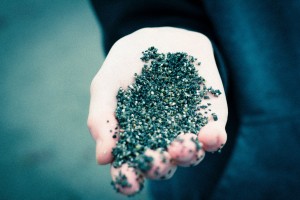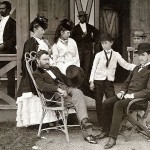
I can’t say for sure, but I think this is our seventh, maybe eighth, trip to the Oregon coast. My first trip was shortly after M and I got married. My life as a Malmgren was just starting then and just as that trip was full of new beginnings this trip is full of finality. This will be our last trip to the coast with M’s mom, B.
The road to the coast is so narrow and winding I get sick traveling it. I didn’t used to, but now, not knowing what is around the next bend fills me with anxiety while the curves make my stomach churn. But even the strong discomfort of the drive can’t quell my amazement with the scenery. The road is lined with Madrone Trees. Their trunks are orange, almost vermilion, and moss hangs from their branches like unkempt hair. The forest is dense but every so often I get an unexpected glimpse of the river we’re following that will eventually lead us to the ocean.
This time the beach we are staying on is rocky. All the other beaches have been sandy. Sometimes the sand is a tawny brown, other times it’s black and glittery. Sometimes the sand is covered in shells, other times sea glass. But this time instead of sand, the beach is made up of billions and trillions of tiny rocks. Rocks that are almost too small to really be called rocks but are certainly too big to be called grains of sand.
The four hour trip from M’s parents house to the coast was very hard for his mom. We had to stop several times on the way out so C could feed her and take her to the restroom. It takes two people to get her in and out of the car. On the way out her foot got caught between the door and the edge of the car. Her ankle twisted and she let out a childlike cry. Her ability to speak has deteriorated. C snapped at her, “Just lift up your foot! You did it last time.” But that’s the thing about ALS, you can do something one day that you can’t do the next.
I was angry. I was angry that C would be anything but sweet with her, but then I thought about an evening not long ago when the boy was banging his elbows on the table over and over and over again. He banged them one more time than I could tolerate and so I looked up and yelled, “STOP IT!” He jumped, then froze. I noticed that his elbows were red and raw from all the banging. I realized no one wanted to stop more than he did. But that’s the thing about Tourette’s. Like a sneeze, a tic won’t be put off even if that particular tic leaves you sore and bruised.
As I stand on the beach and look out across the ocean, I wonder who the disease is harder on, the victim or the caretaker?
Maybe if it were just the Tourette’s I could deal with it. But it’s not just Tourette’s, it’s Tourette’s, fibromas, failure to thrive, deficiencies in IGg, IGm, and IGa. He has CVID, CRMO, and EBV. It’s like the alphabet hates him. The truth is, I’m tired of talking to doctors and insurance companies. I’m tired of filling prescriptions and I’m tired of getting up at two a.m. to refill the formula in his feeding bag. I’m tired of waiting for test results and adding “just one more thing” to his long list of complications.
He’s tired of going to the doctor. He’s tired of being poked and prodded and weighed. He’s angry that he has a tube up his nose and is nervous about upcoming MRIs, x-rays, and surgeries.
I’m tired of feeling guilty. And I do feel guilty. I feel guilty for not being more vigilant, not knowing what to do, and not being able to make things better for him. But as I sat there and looked at his raw and bruised elbows, my guilt became anger. I was mad at myself for being anything but sweet with him. Sadness, exhaustion, guilt, anger—I rotate through them.
The tide is coming in and the water laps at my feet. I take a step backward and I think of our last visit to the immunologist. I’d asked him if the boy was just going to continue to get sicker. He said, “I don’t know.” Then he asked, “Does it matter?” I wanted to yell, “Yes! Yes it matters! I need to know if this is going to end.” But now my mind wanders back to C. C has an end. B has a year, maybe. Maybe not even that. And I realize that I would rather have a million years of uncertainty than a few years of certainty that ends in death.
I find a shallow pool that holds tiny bits of polished pearlescent shells and brightly colored rocks with edges that have been worn smooth by years of tumbling in the ocean. I pick up a small shiny black rock and rub its smooth surface between my thumb and forefinger before slipping it into my pocket.
I watch the waves lap farther and farther onto the shore and I think the boy and I are rocks twisting and turning in the ocean. Occasionally deposited to rest on the shore at low tide but sucked back in to be tossed and turned again at high tide. Right now it is high tide and the boy and I are being beaten by the waves against the craggy boulders near the shore. My mind replays the words of the immunologist, “Does it matter?”
The boy sat on my bed last night and cried, “I feel like I’m falling apart. Nothing works and I’m tired. Tired of everything.” Thinking of this moment, replaying his sobs, I worry if we are rocks, we are rocks that have been worn too small to really be called rocks and soon we will be pummeled to grains of sand and cast haphazardly on the shore. And then it really won’t matter anymore.
I prefer this rocky beach to the sandy ones we’ve previously visited. This beach is full of color and variety. And while most of the rocks here have been worn smooth, others, a few, have retained their sharp, rugged edges, as if they’re not willing to give in and let the ocean’s tide refine them.
Maybe tomorrow, when the sunlight hits the horizon, I’ll realize that we are not rocks in storm-driven waters being ground so small the wind might whisk us away as atmospheric dust. Maybe we are the sharp rugged stones refusing to be shined. Maybe if we let go and allow ourselves to be carried and sorted by the sea, then maybe, just maybe, someone will find us and pick us up. Sparkling. Honed. Finished.
Guest blog: Lis Malmgren










